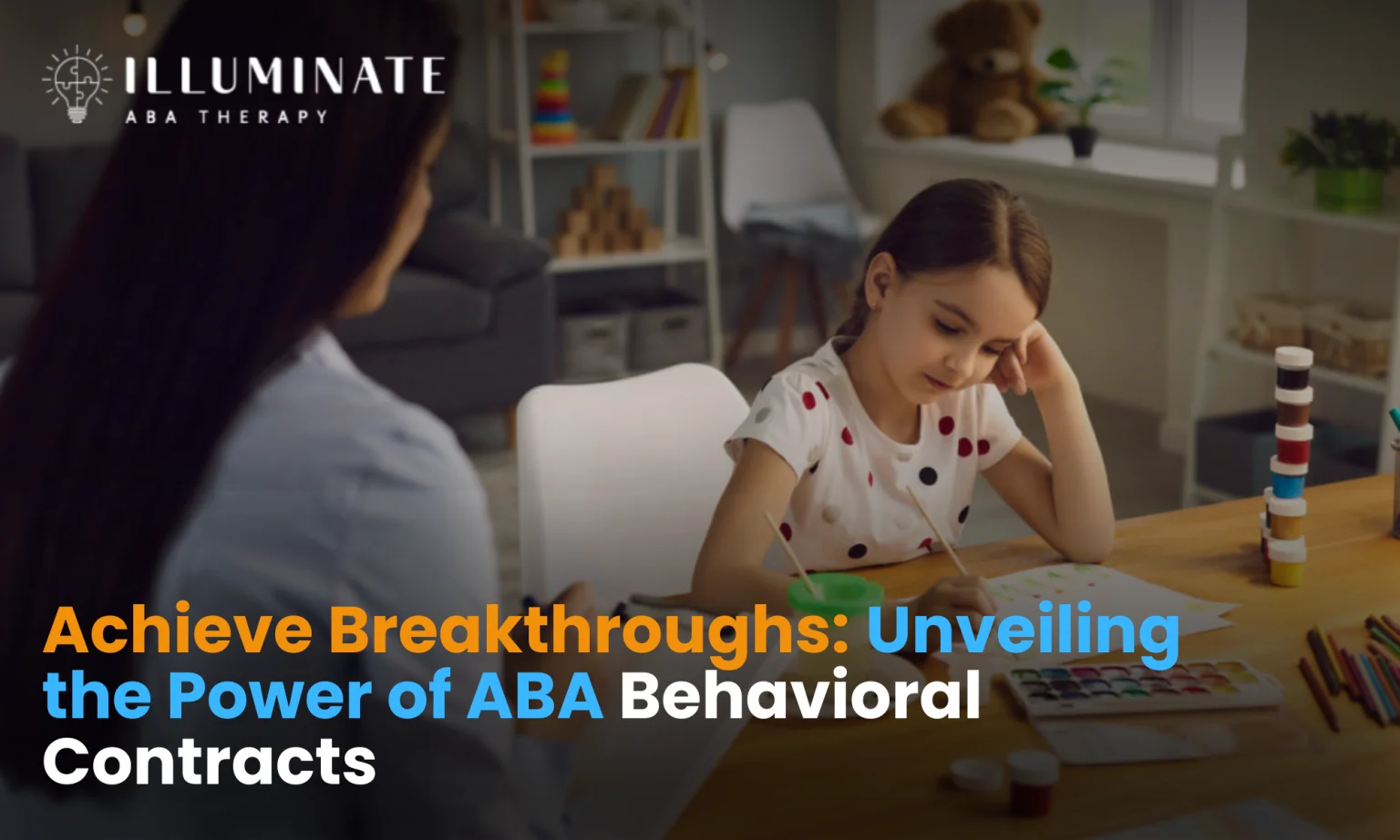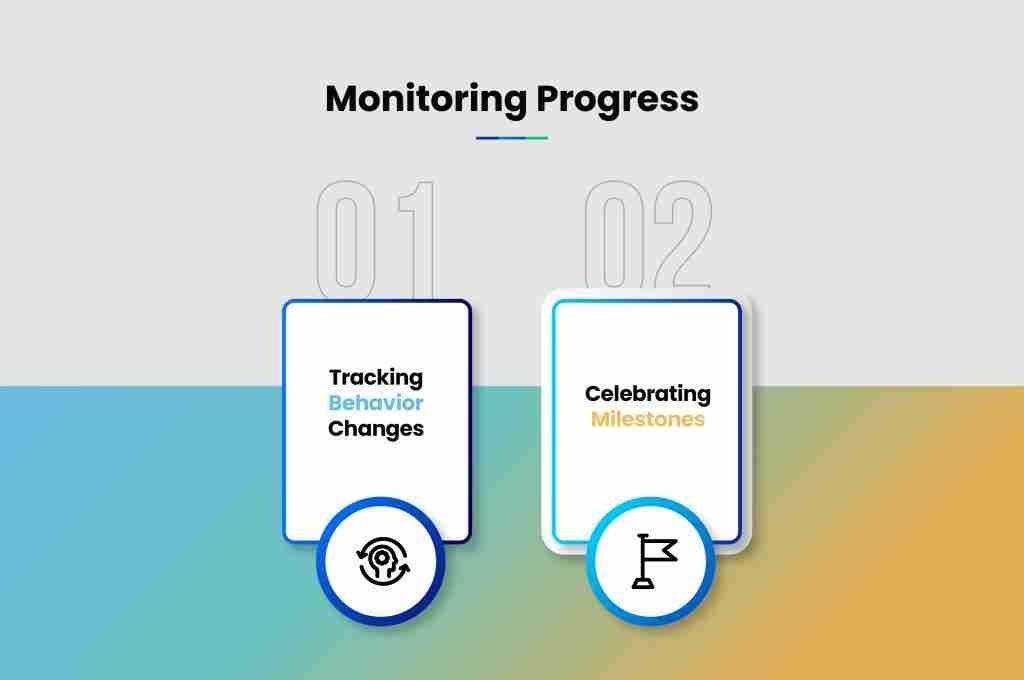Achieve Breakthroughs: Unveiling the Power of ABA Behavioral Contracts
ABA TherapyJuly 17, 2025

Understanding Behavior Contracts
When it comes to making a difference with Applied Behavior Analysis (ABA), think of behavior contracts as a handshake deal with rules, rewards, and consequences. They're especially handy for kids with autism, giving them a sense of responsibility over how they act. These contracts set out what's expected and what happens if those expectations aren't met, laying down a solid foundation for managing behaviors.
Role in ABA Therapy
In ABA land, behavior contracts are not some cookie-cutter deal; they're crafted tools to help folks along the way to better behavior. These contracts spell out goals as clear as day and outline behaviors you can actually spot and measure. This way, kids, especially those with autism, have a guide pointing them in the right direction. The contract takes into account personal quirks, strengths, and hurdles, helping teach new skills and cut down on breakdowns. A behavior contract can turn trouble into triumphs and challenges into cheers (Apex ABA).
Key Components
Making sure a behavior contract hits the mark involves including certain key ingredients. These not only make the contract work but also make it meaningful. Let’s break it down:
- Clear and Specific Goals: Goals in a behavior contract should be as clear as a bell, leaving no room for "what did they mean by that?" Well-defined objectives act like a road sign, pointing towards the desired outcome.
- Measurable and Observable Behaviors: Behaviors should be like a TV episode—easy to watch and understand. When behaviors can be measured and observed, tracking progress or hiccups becomes a piece of cake, making the journey much smoother.
- Tailored Reinforcement and Consequences: The heart of a behavior contract is how you mix motivators and consequences unique to the person's needs. These elements aren't just there to jazz things up but are the drivers of positive change, systematically dealing with various behaviors.
Getting on board with behavior contracts in ABA therapy arms individuals, parents, caregivers, and teachers with a robust framework to steer behavior changes, instill a sense of accountability, and nudge some positive social skills vibes. By introducing well-aimed and personalized behavior contracts, traveling the road to behavioral success and boosting social interaction turns from a dream into a much clearer, achievable reality.
Implementing Behavior Contracts
Implementing behavior contracts in Applied Behavior Analysis (ABA) therapy requires a strategic approach to foster positive behavior change. It's all about setting clear goals and using reinforcement strategies that fit like a glove for each person.
Creating Clear Goals
A solid behavior contract in ABA starts with crystal-clear goals. It's like having a road map that makes everyone's expectations clear and helps track and measure progress. When folks have a clear idea of what's expected, it’s way easier to stay on course and see how things are going.
Goals in a behavior contract should be easy to measure and spot in action. This makes it easier to see how much someone’s improved, turning changes in behavior into visible signs of progress. Setting realistic and reachable goals also plays a big part in keeping people motivated, because when goals are sensible, folks feel they can actually achieve them.
Focusing on specific actions, as suggested by ABTABA, helps ensure there's no confusion about what the goals are. The SMART criteria—Specific, Measurable, Achievable, Relevant, and Time-bound—work wonders in shaping goals that aren't just lofty dreams but are genuinely attainable and clearly defined.
Tailoring Reinforcement Strategies
Figuring out the best reinforcement strategies in behavior contracts is key to pushing and rewarding the behaviors you want to see. You’ve got to think about what the person likes, what gets them going, and what they’re good at when picking the right incentives. The incentives should hit home, making behavior change not just possible but lasting.
As ABTABA points out, the best reinforcement plans consider what the individual finds meaningful. When you customize rewards this way, they pack more punch, leading to a real change in behavior.
An important part of picking these strategies is leaning heavily on positive reinforcement instead of punishment. Positive reinforcement is all about giving more of what the person enjoys to make the good behavior stick. By personalizing the reinforcement methods according to what the individual finds appealing, behavior contracts can really drive behavior change and help build useful skills.
By setting straightforward goals and using reinforcement methods that speak to the individual, behavior contracts in ABA become potent tools for promoting good behavior and skill acquisition. Getting these parts right can make behavior contracts a real game-changer in helping people meet their behavior goals and develop essential life skills.
Monitoring Progress

In the world of ABA therapy, where social skills shine bright and interventions pave the road, tracking progress is like keeping our GPS up and running to check if we're actually getting anywhere. When you keep tabs on behavior tweaks and throw little parties for hitting milestones, caregivers, educators, and therapists can thumbs-up the effectiveness of what they’re doing and give a little nudge to keep that progress train rolling.
Tracking Behavior Changes
Jumping into the business of behavior contracts means laying out the do's and don'ts, keeping your data ducks in a row, and tweaking stuff when it all goes a bit haywire. In the ABA world, keeping tabs on progress means making those goals crystal clear, sticking to solid data collecting habits, and being ready to shake things up when behaviors start doing the twist. This kind of no-nonsense approach helps you figure out if your strategies are hitting the mark or if it's time for a whole new set of game rules.
Celebrating Milestones
If you wanna score big with behavior contracts in ABA therapy, it's all about the three musketeers: consistency, support, and a pat on the back. Stick to the rules, hand out help and resources like candy, and throw those mini-celebrations to keep spirits high and goals within reach (ABTA: Behavior Contract in ABA: Ultimate Guide). When you shout out every little win, kiddos with autism feel seen, cheered on, and eager to rack up more achievements.
Behavior contracts in ABA therapy are those detailed plans showing what needs doing, what happens if it's done, and what goodies await. They're as objective as a referee, making it super easy to track how things are rolling. Plus, when the results are rewarding—like getting some much-deserved praise, earning tokens, or unlocking favorite tasks—it really helps those good behaviors stick. Cheering for every victory not only lifts the mood but cements the value of progress in the grand scheme of behavior change.
Making Behavior Contracts Work
Getting the most out of behavior contracts in ABA therapy means sticking to a few tried-and-true strategies. Keeping things steady, offering support, and teaming up with experts is the secret sauce to seeing real change.
Keeping It Steady and Supportive
When it comes to a behavior contract, keeping your word’s super important. Imagine trying to build a house without a sturdy foundation—it just won’t stand. Same goes for behavior change (ABTABA). If you stick to the game plan with the contracts and follow through with whatever’s agreed upon, folks will pick up on what's expected and start making those positive changes. This makes everything clear as day, helping both kids and adults stick to the plan.
And let's not forget about having someone's back—you gotta support folks through the changes (Apex ABA). Whether it's giving them a pep talk, showing them how it’s done, or cheering them on when they nail it, it all counts. Whatever form support comes in, it's about ensuring they have what they need to keep pushing forward.
Teaming Up With the Pros
Think of professionals like your GPS—guiding you around roadblocks and helping you reach your destination safely. Hanging out with behavior wizards like therapists or teachers helps tailor those contracts (Brighter Strides ABA). They fine-tune the strategies, shape realistic goals, and smooth out any bumps along the way.
When you’re teaming up with these experts, it’s like having an all-star team on your side. It's more than just extra help—it's about creating a whole system that backs you up and aims to make changes stick. Professionals throw in evidence-backed tips and tricks, making sure every move counts toward new behaviors and ultimate goals.
So, to pull it all together—keeping things steady, backing people up, and forming power teams with professionals are the keys to making behavior contracts kick into high gear in ABA settings. These components help folks move toward change that actually matters in their lives.
Get More Insights: Families’ Vital Role in ABA Therapy Success
